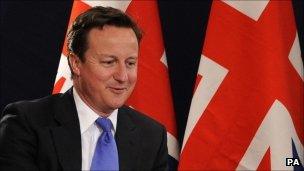David Cameron urged to challenge Russia's Dmitry Medvedev
- Published

David Cameron will be the first prime minister since Tony Blair to visit the Russian capital
David Cameron has been urged by four former foreign secretaries to challenge the Russian government on a number of issues during his visit to Moscow.
They want President Dmitry Medvedev to be confronted over a perceived failure to protect business against corruption.
In a Sunday Times letter, they also call for the PM to raise the murder of Alexander Litvinenko in London in 2006.
The call is from Labour's Margaret Beckett, David Miliband, Jack Straw and Conservative Sir Malcolm Rifkind.
The letter says hundreds of thousands of Russian businessmen are detained in jails after falling victim to corruption sanctioned by the authorities.
They refer to these people as "victims of an increasingly potent mix of corruption and lawlessness".
In their letter, the former foreign secretaries state: "The dangers of this corruption do not stop at Russia's borders and Alexander Litvinenko's murder shows the consequences of such lawlessness hitting British shores.
"In this regard the prime minister has both a domestic and international duty to tackle this issue head on during his visit."
Mr Cameron is flying to Moscow on Sunday in an attempt to improve relations with Mr Medvedev and Russian Prime Minister Vladimir Putin.
Strained relations
He will be the first UK prime minister to visit the Russian capital since Tony Blair six years ago.
Whitehall officials recently revealed that no UK minister or diplomat has spoken directly with Mr Putin for four years.
The BBC's James Landale said the prime minister was expected to see Mr Putin but a formal meeting had not been confirmed.
Relations between the UK and Russia have been strained since the murder of Mr Litvinenko, an ex-Russian security official who had been living in the UK.
Mr Litvinenko - an outspoken Kremlin critic - was fatally poisoned. His death led to both the UK and Russia expelling diplomats.
The 43-year-old was found to have been poisoned with radioactive polonium-210.
Moscow has refused a long-standing request from the UK to extradite the prime suspect in the case, Andrei Lugovoi, a former KGB officer who is now a member of the Russian Parliament and has always denied involvement.
In an interview with the BBC earlier this week, Mr Lugovoi suggested a third country should be brought in to re-investigate the murder in an attempt to break the diplomatic deadlock, and suggested MI6 - and even Mr Litvinenko himself - had been behind the killing.
There have also been tensions over Russia's attempts to shut down the British Council's offices in Moscow.
The UK government's refusal to co-operate and share intelligence since the scandal has harmed counter-terrorism efforts, according to Alexander Yakovenko, Moscow's ambassador in London.
Mr Cameron will travel with a group of businessmen, including Bob Dudley, chief executive of BP, whose Moscow office was raided by special forces last week.
- Published8 September 2011
- Published8 September 2011
- Published13 October 2010
- Published8 September 2011